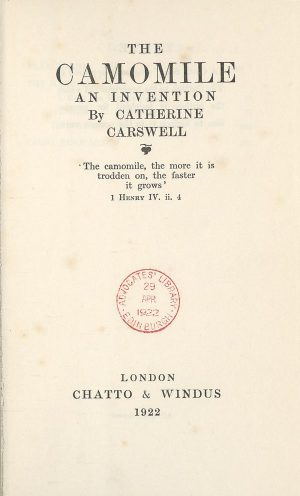The choice: Catherine Carswell, The Camomile: An Invention (London, 1922).
Chosen by: Helen Vincent, Head of Rare Books, Maps and Music
Read or download this book from our Digital Gallery.
Welcome to this first of a new fortnightly series where we introduce you to some favourites from our collections for you to enjoy reading, all freely available online.

What better way to start than with a novel with a library at its very centre? Catherine Carswell’s The Camomile is set in early 20th-century Glasgow, and the Mitchell Library plays a vital part in the heroine Ellen’s voyage of self-discovery.
In many ways The Camomile is a Scottish fictional counterpart to Virginia Woolf’s feminist classic A Room of One’s Own, which it predates by several years – 1922 to Woolf’s 1928. Woolf talks about how women of the past did not have such a room, and how hard it was for women of her own day to find one. Carswell gives us the embodiment of this dilemma in her protagonist Ellen, stuck in a middle-class tenement flat amid the conventions of the Glasgow social life for a young lady of her day – the church and school socials, prayer meetings, young men looking to make a career that will probably take them abroad and women of all ages walking the tightrope between dressing respectably and, horror of horrors, making too much of themselves.
This afternoon, as you might see advertised in to-day’s Glasgow Herald, the Monthly Tea-and-Prayer Gathering was held in our dining-room (not in the drawing room, because the piano is not so suitable as the harmonium), and was addressed by our dear friend, Miss Davida Jones, who has always so many interesting things to tell us of Work in the Zenanas. Last night I was kept busy writing post-cards to members of the Tea-and-Prayer Gathering just in case they might not read their Heralds closely enough, and this morning Aunt Harry called on as many of them as she could, lest, I suppose, they should not have noticed my post-cards. In Glasgow we are nothing if not thorough.
Ellen’s struggle to find a mental and physical space away from her family, even while she loves them very much, will surely resonate with a lot of people right now, and it is this which leads her to a library:
I’m seizing the opportunity of the school holidays, which are still on, to go oftener than ever to the Mitchell Library to read. It is not a convenient place to get at – especially in this weather – quite a long car journey to a dismal little street full of warehouses and cranes that keep hoisting and lowering piles of wooden crates full of goods, so that one can hardly walk on either pavement … But I must have books, and have them without feeling that Aunt Harry is reading them over my shoulder or burrowing among my underclothes for them when I’m out. … So I go to the old Mitchell, and from the very distance and discomfort, and the fact that I can’t take the volumes home, I am compelled to pick out only the books I vitally want.
I first read this novel as a student, and instantly fell in love with it, so much so that on my first ever visit to Glasgow I had to make a special pilgrimage to the Mitchell Library to see the place where Ellen experienced such revelations about the life of the mind and her fellow human beings.
I’m constantly surprised by the fact that The Camomile doesn’t hold a higher place in the Scottish literary canon. Is it the chatty style of writing in which Ellen discusses everything from the ever-changing Glasgow weather to the mysteries of other people’s inner lives? This narration is in fact deceptively simple and part of the pleasure of reading this book is of reading between the lines of Ellen’s narration to see more of her world than she sees herself.
Ironically for a writer whose fiction articulates how hard it is for a woman to exist as a fully realised independent being, Carswell is all too often defined by her relationships with two men whose biographies she wrote – D.H. Lawrence, also reflected in her other novel Open the Door, and Robert Burns, with her Life of him still criticized today by those who disapprove of her take on Jean Armour. The Camomile, by turns funny about the mundane and insightful about the human incapacity ever truly to know oneself, let alone other people, is perhaps the best introduction to her writing, and a delightful book to read, hopefully without the interruptions that plague Ellen’s own literary endeavours.
Look out in two weeks for our next Curator’s Favourite, and in the meantime enjoy reading!
Further information
- Appropriately enough, the Mitchell Library houses Carswell’s archive.
- Digitised copies of the first editions of all Catherine Carswell’s books can be found in our Digital Gallery feature Works By Selected Scottish Authors.
- For a picture of what life was like in Glasgow at the time of the novel, see the contemporary short film Great Western Road 1922 from our Moving Image Archive.